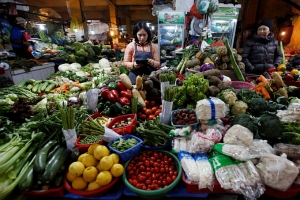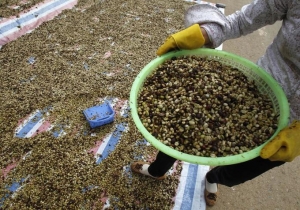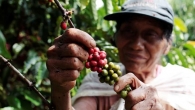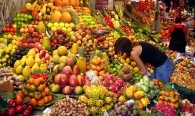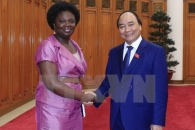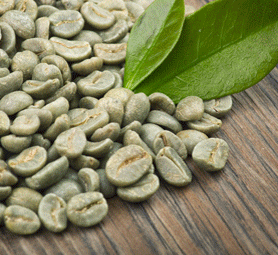Vietnam moves up 13 places on Economic Freedom Index, but remains in the ‘mostly unfree’ class.
the Heritage Foundation, an American conservative public policy thinktank based in Washington, D.C.,Vietnam is ranked 128th out of 180 countries and territories on the 2019 Economic Freedom Index, up 13 places from last year.
On this index, it fares unfavorably against Southeast Asian peers like Singapore (2nd), Thailand (43rd), Indonesia (56th) and the Philippines (70th).
Its overall score increased by 2.2 points from last year to 55.3 thanks to improvements in fiscal health, investment freedom and judicial effectiveness, according the report.
However, tax burden, monetary freedom and financial freedom are still inhibited.
Vietnam finished 30th out of 43 countries in the Asia Pacific region, below China and its smaller neighbors Cambodia and Laos.
The U.S. foundation said that Vietnam could improve its economic environment by continuing to reform state-owned enterprises, reducing red tape, increasing transparency in the business and financial sectors, reducing bad debt in the banking sector and increasing recognition of private property rights.
The ranking is based on 12 quantitative and qualitative factors grouped into four broad categories, including rule of law, government size, regulatory efficiency and open markets to measure economic freedom in 180 countries and territories across the world.
The world average score is 60.8, classifying the global economy as "moderately free".
Only six economies are classed as "free" by earning scores of 80 or above. Hong Kong and Singapore finished first and second in the rankings for the 25th consecutive year, followed by New Zealand, Switzerland, Australia and Ireland.
The world’s biggest economy, the U.S. ranked 12th globally, jumping six places from the last year’s ranking while China is far behind in 100th place.
This year, the number of economies ranked as ‘mostly unfree’ stands at 64, while 21 are considered "repressed".
Vietnam’s economy expanded 7.08 percent last year, which helped the country retain its status as one of the best performing economies in the world.
It was the highest growth the country has experienced since 2008 and compared with the median estimate of 6.9 percent in a Bloomberg survey of 12 economists.
Low water levels and threat of a drought in Vietnam’s main coffee growing region would hurt this year’s output in the world’s second-biggest producer of the bean.
The Central Highlands, Vietnam’s main coffee growing region, is in the peak of its dry season, which lasts from November to April, and several provinces have recorded low water levels in both rivers and water reservoirs, local media have reported.
"At the beginning of the dry season, some areas of the Central Highlands severely lacked water and drought is expected to be severe during the dry season," the Vietnam Coffee and Cacao Association said in a statement on Tuesday.
Rain is expected at a lower-than-average level during February-May this year but could pick up to the average level during May-August, the National Center for Hydro-Meteorological Forecasting agency said in its latest forecast on Feb. 15.
Falling coffee prices also discouraged farmers from looking after the coffee trees, the association said, adding that it could affect the beans’ quality and output for the 2018/2019 crop year, for which harvest is due around November or December.
"Coffee output of this crop year and the crop year after that will fall significantly," the association said, adding that the coffee plants are also affected by insects.
Domestic coffee prices COFVN-DAK have fallen much from a six-year high reached in March 2017 of 47,650 dong ($2.05) to hover in between 32,700-38,250 dong so far this crop year, Reuters data showed.
A Reuters poll last month showed Vietnam’s coffee output is expected at 30 million 60-kg bags in the 2018/2019 crop year, up from an earlier estimate of 28.5 million bags.
The United States Department of Agriculture in December also revised up its 2018/2019 coffee output estimate for Vietnam, including both robusta and arabica production, to 30.4 million bags from a 29.9-million-bag forecast earlier.
Vietnam’s Coffee King will manage the Trung Nguyen Group and own 60 percent of shared assets, the court has ruled.
In its divorce settlement ruling, the Ho Chi Minh City People’s Court said Wednesday that the stocks and cash of the Trung Nguyen Coffee group shared by Dang Le Nguyen Vu and Le Hoang Diep Thao will be split 60:40 in Vu’s favor.
Their properties, including land and buildings, will be split equally, the court ruled.
The value of the couple’s combined stake in the group is estimated at over VND5.7 trillion ($245.14 million).
The court also ruled that since the division of the company’s shares will cause difficulties in managing the company, Vu would buy all of Thao’s shares with cash and the latter will no longer be a Trung Nguyen shareholder.
The court explained its decision saying Vu had contributed more than Thao to establishing and developing the company.
The cash deposits of the couple, valued at VND1.76 trillion ($75.69 million), will also be divided 60:40 in Vu’s favor.
The court also said that 13 properties (buildings and land) that the couple own will be divided equally. Thao will raise the four children they have had together, and Vu will give them VND10 billion ($431,135) a year starting 2013 until they graduate from college.
Responding to the court’s verdict, Thao said: "This is too unfair to me."
Vu and Thao married in 1998. They started to have conflicts in 2013, and Thao filed for divorce in 2015.
Thao had previously proposed that she gets 51 percent (VND2.11 trillion or $90.7 million) of Trung Nguyen Investment, a company which owns the majority of shares of Trung Nguyen Group.
She had also proposed that Vu and her each own 15 percent (VND814 billion, $35 million) of Trung Nguyen Group and 7.5 percent (VND43 billion, $1.85 million) of Trung Nguyen Instant Coffee. Thao agreed to give Vu her shares in the other four companies under Trung Nguyen brand.
But Vu wanted to have 70 percent of all of companies under the Trung Nguyen brand and to buy the remaining shares from Thao in cash.
Trung Nguyen Group is a leading coffee firm in Vietnam. It earned revenues of VND3.95 trillion ($170.5 million) and pretax profits of VND681 billion ($29.4 million) in 2017. It has 200,000 coffee stores in the country.
By Hai Duyen (vnexpress)
Japan has increased its imports of Vietnamese coffee thanks to low prices and the geographic proximity between the two countries.
In January-November 2018 its imports rose by 15 percent to 94,000 tons, according to the Nikkei Asian Review.
Vietnam mostly produces the robusta variety of coffee, which is somewhat bitter compared to Brazil's arabica.
Industry insiders said Japanese consumers’ preference for good tasting, low-priced coffee is driving robusta's market share there. Robusta beans are currently trading at around 68 cents per pound, more than 30 percent lower than arabica’s $1.03.
Besides, from Vietnam and other regional countries only takes about half as long as from Latin America, which accentuates the price difference.
Last year Vietnam exported 1.89 million tons of coffee worth $3.5 billion, up 20.1 percent in volume and 1.2 percent in value from 2017, according to the General Statistics Office. Its largest markets were Germany, the U.S., Italy, Spain, and Japan.
The country’s coffee output might fall by 20 percent this year because of low water levels and the threat of a drought in its main coffee-growing region, the Vietnam Coffee and Cacao Association has warned.
By Dat Nguyen (vnexpress)
Vietnamese leaders are being called on to rethink whether Vietnam should become a big rice exporter or a fruit export power, as fruit export turnover exceed rice exports in the first seven months of this year for the first time A newly released report by the General Department of Customs (GDC) shows that Vietnam earned $1.35 billion from fruit exports, but only had $1.32 billion from rice exports.
The figure, in the eyes of analysts, could be a shock to the Vietnamese, who have been proud of being one of the biggest rice exporters in the world.
To protect the title of the world’s biggest rice exporter, Vietnam has made heavy investments in the rice cultivation area, the labour force and in investment capital, far exceeding investment in fruit production.
Fruit production, a newly emerging field in the last few years, has quickly outstripped rice production, which has been receiving preferences for a long time.
Nguyen Quoc Vong, an agriculture expert, said on Thoi Bao Kinh Te Sai Gon that the superiority of fruit over rice export was foreseeable. The analyst, while noting that the rice export in the first months of the year was unsatisfactory because of the serious drought in the Mekong River Delta and the price decrease in the world market, said that the superiority is inevitable.
The fruit exports have been growing steadily in the last few years. In 2012, the fruit export turnover was $770 million only. Meanwhile, the figure soared to $1.04 billion 2013, to $1.47 billion in 2014 and $2.2 billion in 2015.
Just within four years, from 2012 to 2015, Vietnam’s fruit export value increased by three times. Meanwhile, the rice export value has not increased considerably in recent years, at around $2.7-2.8 billion a year.
“Why doesn’t Vietnam think of pushing up the export of fruits instead of rice if the world’s fruit market is larger?” the analyst said.
He cited a report of FAO as saying that in 2010, the world’s rice market was worth $17 billion, while the global fruit market was $97 billion.
If considering the total demand of different kinds fresh fruits & vegetables, as well as canned, dried & frozen products, the figure was $203 billion in 2014, and would be $320 billion by 2020, according to a Zion Research report.
(Tuoi Tre News)
The Vietnamese Government will continue to tighten cooperation with the World Bank, especially in coping with climate change and saltwater intrusion, improving public administration and investment climate, and fighting corruption.
Prime Minister Nguyen Xuan Phuc, who was sworn in on April 7, made the remarks at a reception for World Bank (WB) Country Director in Vietnam Victoria Kwakwa in Hanoi on April 9.
He said Vietnam appreciates the effective support and consultation of the WB in general and Country Director Victoria Kwakwa in particular, and regards the bank as a reliable partner and great friend of the country.
The Government leader suggested the two sides increase the exchange of information to improve collaboration efficiency.
For her part, Victoria Kwakwa congratulated Nguyen Xuan Phuc on his election as Prime Minister and the National Assembly approval of the new Cabinet members.
She affirmed that the WB attaches importance to its cooperative ties with Vietnam and hopes the new PM will work to elevate bilateral cooperation to a new height.
The official noted that the WB is keen to cooperate with the Vietnamese Government in coping with climate change, developing the private economic sector, and enhancing the Government’s accountability and anti-corruption capacity.
She expressed her deep concern over the ongoing severe drought and saltwater intrusion in the Central Highlands and Mekong Delta, saying the WB has been supporting Vietnam to deal with the issues in the short and middle terms so that the country can adapt more effectively to climate change and mitigate related damages.
Regarding the development of the private economic sector, Kwakwa advised the Vietnamese Government to step up institutional reform and create an equal playground for all types of businesses, thus helping them connect with global value chains, especially when the country is making negotiations as well as preparations for joining a number of big free trade agreements.
The WB is willing to provide financial and expertise support for Vietnam to develop its private economic sector, she added.
(Image's description: Prime Minister Nguyen Xuan Phuc receives WB Country Director in Vietnam Victoria Kwakwa)
HANOI - Coffee premiums in Vietnam narrowed as farmers held back stocks expecting a further jump in robusta prices, but were up in Indonesia on thin stocks and local demand, traders said on Thursday.
Premiums for Vietnamese robusta grade 2, 5 percent black and broken narrowed to $50-$60 a metric ton to the July ICE contract from $50-$70 a week ago.
Robusta rose to 31.5 million-31.8 million dong ($1,413.19-$1,426.65) per metric ton in Daklak, the country's top growing province, from 31.1 million-31.4 million dong last Thursday, tracking gains in the ICE robusta futures.
ICE May robusta coffee settled up 0.21 percent at $1,426 per metric ton on Wednesday.
"Sales are a bit slower today as farmers expect further climb in prices," said independent analyst Nguyen Quang Binh.
The dry season is at its peak in Vietnam's Central Highlands coffee belt, affecting nearly a fifth of the coffee farms, according to an industry report. The rainy season could arrive 10-15 days later than usual this year.
Vietnam, the world's largest robusta producer, exported 119,000 metric tons (1.98 million 60-kg bags) of coffee in February, down 30.1 percent from the previous month, customs data showed on Monday.
In Indonesia, premiums rose to $300-$350 a metric ton for beans grade 4, 80 defects <COFID-G4-USD> to the ICE May contract, from $300-$320 last Thursday, due to thin stocks, traders said.
"There is little in the way of stocks (but) there's high domestic demand from grinders in Java, along with exports by individuals," a Lampung-based trader said.
The country's main harvest will pick up from late March.
Indonesia's coffee bean production is expected to increase by up to 27 percent to 700,000 metric tons in 2016, a manager at the country's coffee association said on Thursday, up from 550,000 metric tons in 2015.
By My Pham/Reuters
When the Vietnam war ended in 1975 the country was on its knees, and economic policies copied from the Soviet union did nothing to help.
Collectivising agriculture proved to be a disaster, so in 1986 the Communist Party carried out a U-turn - placing a big bet, at the same time, on coffee.
Coffee production then grew by 20%-30% every year in the 1990s. The industry now employs about 2.6 million people, with beans grown on half a million smallholdings of two to three acres each.
This has helped transform the Vietnamese economy. In 1994 some 60% of Vietnamese lived under the poverty line, now less than 10% do.
"The Vietnamese traditionally drank tea, like the Chinese, and still do," says Vietnam-based coffee consultant Will Frith.
Vietnamese people do drink it - sometimes with condensed milk, or in a cappuccino made with egg - but it's mainly grown as an export crop.
Coffee was introduced to Vietnam by the French in the 19th Century and a processing plant manufacturing instant coffee was functioning by 1950.
This is how most Vietnamese coffee is consumed, and is partly why about a quarter of coffee drunk in the UK comes from Vietnam.
British consumers still drink a lot more of that than of fancy coffees, such as espressos, lattes and cappuccinos.
High-end coffee shops mainly buy Arabica coffee beans, whereas Vietnam grows the hardier Robusta bean.
Arabica beans contain between 1% to 1.5% caffeine while Robusta has between 1.6% to 2.7% caffeine, making it taste more bitter.
There is a lot more to coffee, though, than caffeine.
"Complex flavour chemistry works to make up the flavours inherent in coffee," says Frith.
"Caffeine is such a small percentage of total content, especially compared to other alkaloids, that it has a very minute effect on flavour."
Some companies, like Nestle, have processing plants in Vietnam, which roast the beans and pack it.
But Thomas Copple, an economist at the International Coffee Organization in London, says most is exported as green beans and then processed elsewhere, in Germany for example.
While large numbers of Vietnamese have made a living from coffee, a few have become very rich.
Take for example multi-millionaire Dang Le Nguyen Vu. His company, Trung Nguyen Corporation, is based in Ho Chi Minh City - formerly Saigon - but his wealth is based in the Central Highlands around Buon Ma Thuot, the country's coffee capital.
Chairman Vu, as he is nicknamed, owns five Bentleys and 10 Ferraris and Forbes magazine assessed him to be worth $100m (£60m). That's in a country where the average annual income is $1,300 (£790).
The expansion of coffee has also had downsides, however.
Agricultural activity of any kind holds hidden dangers in Vietnam, because of the huge numbers of unexploded ordnance remaining in the ground after the Vietnam War. In one province, Quang Tri, 83% of fields are thought to contain bombs.
Environmentalists also warn that catastrophe is looming. WWF estimates that 40,000 square miles of forest have been cut down since 1973, some of it for coffee farms, and experts say much of the land used for coffee cultivation is steadily being exhausted.
Vietnamese farmers are using too much water and fertiliser, says Dr Dave D'Haeze, a Belgian soil expert.
"There's this traditional belief that you need to do that and nobody has really been trained on how to produce coffee," he says.
"Every farmer in Vietnam is the researcher of his own plot."
Some people from Vietnam's many ethnic minorities also say they have been forced off their land.
But Chairman Vu says coffee has been good for Vietnam.
He is now planning to set up an international chain of Vietnamese-style coffee shops.
"We want to bring Vietnamese coffee culture to the world. It isn't going to be easy but in the next year we want to compete with the big brands like Starbucks," he says.
"If we can take on and win over the US market we can conquer the whole world."
BBC
HANOI: Vietnam, the world's largest robusta producer, will export an estimated 160,000 tonnes (2.67 million 60-kg bags) of coffee in March, up 18.8 percent from a year earlier, the government said on Friday, in line with market expectations.
The shipment brought to 794,300 tonnes the country's coffee exports so far in the 2015/2016 season, an increase of 19.9 percent from the previous season, the General Statistics Office said in a monthly report.
Traders had forecast coffee exports in March at 150,000-160,000 tonnes.
Vietnam's coffee crop year lasts from October to September.
Khoa Le
Source: Business Recorder
We would like to thank the attention of customers in recent years.
MASCOPEX pleasure to introduce the new service of our company - Services Airfares - domestic and international.
Together with a staff of enthusiastic, experienced and honest, you will get free advice flight itinerary, flight times, fares best and most suitable ....
We wish to continue to receive support from you in the near future and do not forget to contact us if you need:
MASCOPEX JOINT STOCK COMPANY
Phone: (+84) 58 3838666
Hot-line 1: (+84) 90 5511788 (Ms Hang)
Hot-line 2: (+84) 98 2263254 (Ms Thanh)
Email: This email address is being protected from spambots. You need JavaScript enabled to view it.
VIDEO CLIP

" MASCOPEX Joint Stock Company has been striving to become the Top Prestige –Trust – Quality in the fields of import & export Agricultural Product. "


